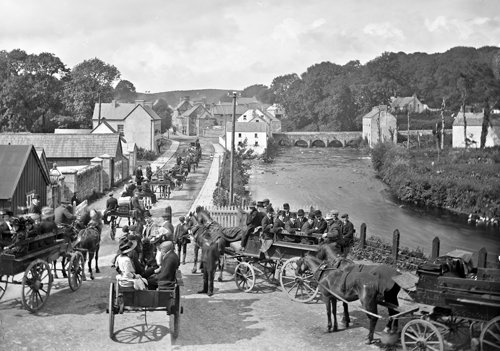Pettigo: A political powder-keg turned “model village”
Dublin, 29 May 1923 - Pettigo a small village on the border of Donegal and Fermanagh and more recently between the Irish Free State and Northern Ireland, is a lot calmer and more contented than it was a year ago when it was powder-keg of political tensions.
The Minister for Home Affairs, Mr. Kevin O’Higgins, addressed the situation in Pettigo today in response to a series of queries relating to costs contained in the Government’s estimates, including £500 for a Civil Commissioner for the village.
In an effort to ease tensions in Pettigo which occurred as the result of incidents which saw British troops encroach upon the territory of the Free State and occupy the village, the Provisional Government selected police for the area and appointed a protestant Civil Commissioner to receive any complaints that members of the protestant community might seek to make.
Explaining the decision to appoint a Civil Commissioner, Mr. O’Higgins said there was a ‘tendency to represent the Orange or Protestant inhabitants of that area being in a state of terror, owing to the impending Free State occupation and administration, and it was considered wise and advisable, without ourselves agreeing that there was any particular ground for that suspicion or distrust to take all reasonable steps to meet those fears.’
An animated history: The Northern Offensive - The Battle of Pettigo and Belleek 1922
As it turned out, very few complaints were made to the Civil Commissioner, but his presence, O’Higgins argued, had a ‘steadying effect... Pettigo, which six or eight months ago was in an inflamed condition holding possibilities of trouble that might spread widely and intensively in that area, is now a little short of a model village.’
Indeed, where once Pettigo was considered a ‘little barrel of gun-powder on the Border line, with possibilities of trouble, one might say, out of all proportion to its own intrinsic importance’, the situation today is transformed. When representations were made to the British to withdraw their troops, this was done and now there was little need for a Civil Commissioner.
Mr. O’Higgins concluded that:
‘The most cordial relations exist between all creeds and classes there, and between those Protestant inhabitants and the forces of the Government, of which they stood in dread before our administration. It is perhaps more correct to say they were taught to stand in dread. The need for the Commissioner there is rapidly passing away, and steps will be taken to place the person in question on some other employment.’
[Editor's note: This is an article from Century Ireland, a fortnightly online newspaper, written from the perspective of a journalist 100 years ago, based on news reports of the time.]





















